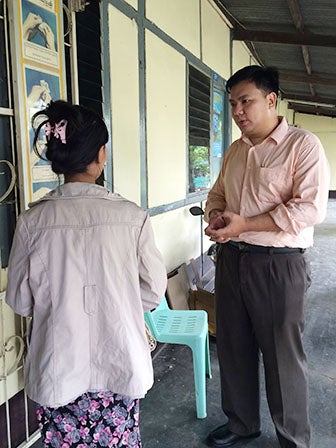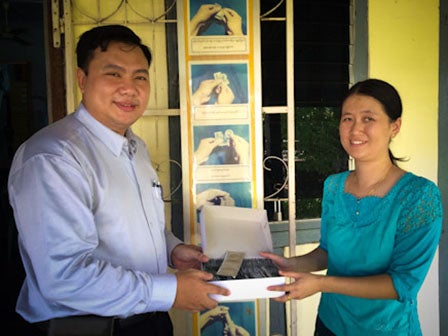Barely out of her teens, 20 year-old *Ma Aye (not her real name) became a mother only four short months ago. However, instead of enjoying her new role with her healthy baby girl, she carries a dark secret that prevents her from feeling blessed.
As she sits in the drop-in clinic looking down at her feet and on the verge of breaking into tears, her life is far from ideal. She has HIV. When she was in her early stages of pregnancy she was diagnosed with HIV by the midwife who was providing her with antenatal care and was referred to the hospital where she received prevention of mother-to-child treatment of HIV (PMTCT). The mother-to-child transmission (MTCT) of HIV refers to the transmission of an HIV-positive woman to her child during pregnancy, labour, delivery and breastfeeding. According to the WHO it is estimated that in the absence of any interventions transmission rates range from 15-45% of children become infected with HIV through mother-to-child transmission (MTCT).This rate can be reduced to level below 5% with effective interventions.
Since 2013, and with the support of the United Nations Population Fund (UNFPA), Myanmar’s midwives have expanded their skill sets and scope of work to include tasks normally undertaken by nurses such as administering injections, blood taking and screening for infectious diseases such as HIV/AIDS, sexually transmitted infections (STIs) and distribution of family planning commodities. UNFPA also trains midwives on mother-to-child transmission prevention and counselling to affected persons to reduce stigma. Forty midwives from the district come to the drop-in clinic three times a year to receive refresher training on HIV prevention.
The HIV drop-in clinic, which is located in downtown Tachileik, Shan State, a border town notorious for its illegal drug trade, also known as the city of the Golden Triangle due to its closeness to Thailand and Laos, is supported by UNFPA in-cooperation with its implementing partners the Myanmar Anti-Narcotics Association (MANA), Populations Service International (PSI) and the National HIV Programme (NAP). Most of the HIV affected persons in Tachileik are involved in sex work and drug taking. Many have contracted the virus from needle sharing while injecting drugs and engaging in unprotected sex.
*Ma Aye is one of approximately 20 patients who daily visit the drop-in clinic for treatment, counselling and learn about HIV prevention such as the comprehensive condoms distribution and awareness programme. “At first my husband did not want to use a condoms, but after speaking to the counsellor who explained how to use a condom and to prevent him getting infected with HIV, he has now agreed to always use a condom. We also use a condom for family planning purposes, because I do not want to have another child that could get HIV,” she said. It is estimated that approximately 80% of persons infected with HIV contracted the infection from having un-protected sex.

UNFPA work focuses on prevention of HIV/AIDS
UNFPA is focusing on prevention of HIV/AIDS through sexual transmission amongst young people, women and most at risk groups such as female sex workers (FMSs), men who have sex with men (MSMs) and 23% for people who inject drugs (PWiDs). Figures suggest 6.3% prevalence amongst FMSs and 6.6% amongst MSMs. On a global scale, 35.3 million people live with HIV/AIDS.
UNFPA is contributing US$5.8 million to the Myanmar sexual and reproductive health programme, including HIV/AIDS prevention and covers one third of the country’s need for contraception. At the Tachileik drop-in clinic they receive annually 15 cartons containing 7200 condoms as part of the UNFPA condoms distribution and education programme. Each box contains 140 condoms that are handed out for free as part of the prevention programme.
HIV Stigma Remains High
Since her diagnosis, *Ma Aye has been coming regularly to the clinic for her monthly counselling sessions, treatments, check-ups and blood tests. During her pregnancy her husband would accompany her to the midwife. But learning that she had contracted HIV, the result of a brief fling with another man, he no longer comes with her. “My husband does not have HIV, neither does our daughter, and for that I am thankful. I contracted HIV because I had un-protected sex with another man who infected me. When the midwife tested my blood I had no choice but to tell my husband of the affair. It was the hardest thing I ever had to do,” said *Ma Aye. “I never heard about HIV before I got diagnosed. Most people do not understand what it is, only that it is very bad and you will die. My family and my community know that I have HIV and they discriminate against me. My mother-in-law is urging my husband to divorce me,” she said. Counsellors are visiting her when they go to her community to provide family counselling and awareness on HIV. Despite this, stigma on the disease remains high.
In Myanmar HIV/AIDS is still considered a taboo subject and as a result of the stigma attached to the disease, many people delay or avoid getting tested. Others receive treatment much later than they should. According to official figures the number of persons in Myanmar living with HIV is estimated to be approximately 215,000, but that number is, in reality, much higher and it is expected to rise in the coming years as the population becomes more mobile due to the country’s on-going socio-economic transformation. According to 2012 official data, approximately 80% of those who need anti-retroviral therapy (ART) treatment receive it.
“When I come to the clinic I feel happy because they do not discriminate against me. They offer me support and provide me with free condoms, treatment and counselling”. One day I hope to work in a market stall across in Thailand so that I can earn enough money to take care of myself and my baby in case my husband leaves me,” said *Ma Aye.

Dr. Nang Mo Mo Hom, 33 year-old and Team Leaders of the National AIDS Programme in Tachileik is responsible for the daily activities carried by a staff of six basic health workers at the UNFPA supported drop-in clinic. Dr. Nang Mo Mo Hom who is currently 3 months pregnant with her second child works tirelessly to promote HIV prevention and education, as well as to provide counselling to affected groups in stigma free locations. *Ma Aye is one of her patients and she tries to console her through weekly counselling sessions. As a mother herself she feels for *Ma Aye. “HIV awareness in Myanmar is very low, especially in rural communities. Most of the patients when first diagnosed suffer a lot of stigma and a sense that their lives are over. However, through counselling and once they starting the ART treatment many realise that if they keep taking the medication in a timely matter they can live a relatively normal lives. This usually makes them feel more at ease and it gives me a sense of satisfaction when that happens and the motivation to carry on my work,” said Dr. Nang Mo Mo Hom.
“In Tachileik there is a high prevalence of HIV cases amongst the sex workers. In 2014, more than 800 patients who came to the clinic were tested for HIV and of those 160 were confirmed as HIV positive, most of them associated with the sex worker community, mainly female sex workers (FSW) and men who have sex with men (MSM). There are approximately 188 sex workers in Tachileik. At our clinic we currently provide treatment to 270 affected persons,” said Nang Mo Mo Hom.
On a nation-wide scale, UNFPA supports within its 3rd country programme. This includes HIV prevention consisting of a comprehensive condom programme (CCP), reaching 34 townships for the HIV prevention of mother to child transmission programme (PMCT). UNFPA focuses mainly on prevention of HIV through sexual transmission.


